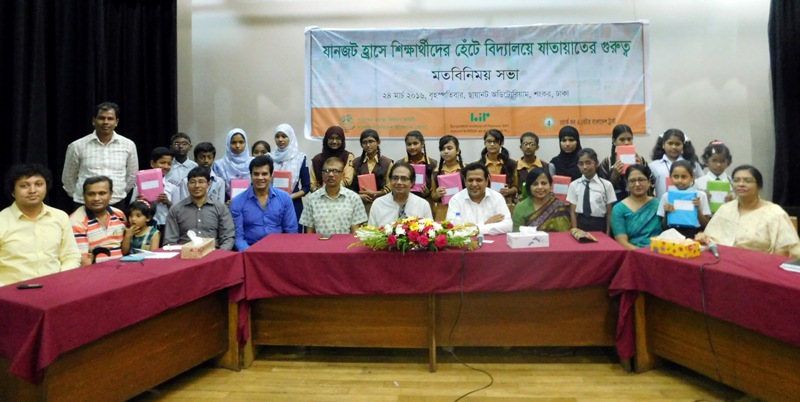
 If children walk to school it will help to reduce dependency upon vehicle and will also be helpful to reduce traffic jam, transportation cost, fuel use and environmental pollution. But poor walking condition is causing suffering to children and their parents. As a result we can see an adverse effect on their health and socialization process. On 24th March 2016, Bangladesh Institute of Planners (B.I.P), Transport Committee of Bangladesh Poribesh Andolon (BAPA) and Work for a Better Bangladesh Trust jointly organized a view exchange meeting on ‘Importance of Ensuring Active and Safe Route to School to reduce Traffic Congestion’ and speakers expressed the above mentioned view in the program.
If children walk to school it will help to reduce dependency upon vehicle and will also be helpful to reduce traffic jam, transportation cost, fuel use and environmental pollution. But poor walking condition is causing suffering to children and their parents. As a result we can see an adverse effect on their health and socialization process. On 24th March 2016, Bangladesh Institute of Planners (B.I.P), Transport Committee of Bangladesh Poribesh Andolon (BAPA) and Work for a Better Bangladesh Trust jointly organized a view exchange meeting on ‘Importance of Ensuring Active and Safe Route to School to reduce Traffic Congestion’ and speakers expressed the above mentioned view in the program.
Gaous Pearee, Director, Work for a Better Bangladesh Trust, said that, our children are leading an active life because of lack of enough open space. So they are being victim of various diseases. If they walk to school daily then it will meet the need of physical activity.
Maruf Hossain, Program Manager, Work for a Better Bangladesh Trust and the key note speaker of the program said that, one of the major problems of Dhaka today is traffic jam. Especially the high usage of private car has increased the problem in a great extent. Study shows that, 95% children walk to school in Rayerbazar area and 77.38% and 73.21% children face problem from speed of cars and garbage on the road. If Rayerbazar to Sankar area is made pedestrian friendly it can be a model for other areas.
The meeting was presided by Dr. Akter Mahmud, General Secretary, Bangladesh Institute of Planners (B.I.P). He said, to what extent a city is lively and safe can be understood by its footpath. if schools of all area are of same quality then the need of going in another area for schooling will reduce. Our development process should not be Dhaka centric.
Ilias Kanchan, Chairman, Nirapad Sarak Chai said that, our city is not child-friendly. Urban roads are like threat to us. People should take some responsibility now rather than depending upon government. Students should be trained about the rules to follow in the roads.
Abu Naser Khan, chairman, Poribesh Bachao Andolon (POBA) said, it is important to take joint initiative to ensure a safe city for the future generation. It is important focus on greenery rather than focusing on concrete to make a city liveable.
J K Boral, Joint Secretary of BAPA said that, we need to ensure children’s participation in family and state level but we are unsuccessful to create such environment. If we want to ensure a safe city for the children then we should divide Dhaka city into 10 zones and coordinated activities by government and non-government organization should be taken.
Professor Dr. Ishrat Islam, Head of the department of Urban and Regional Planning, said that, the city is gradually losing its livability. We are snatching the natural life from the future generation. Now we’ll have to take steps and change our behavior to make this city livable again.
Aminur Rasul, Member Secretariat, Unnayan Dhara Trust, said that, walk to school will ensure socialization of the children. If teachers are more active to develop the standard of the school then it will reduce the tendency to attend schools in distant area.
Nikhil Bhadra, Senior Reporter, Daily Kaler Kantho , said that, though most of the students in Rayerbazar area walk, we are unable to provide them any kind of facilities. Government has announced 40% quota for local students, it should be increased to 80%.
The program was moderated by Naima Akter, Assistant Advocacy Officer, Work for a Better Bangladesh Trust. Other speakers of the program were planner Syeda Monira Akter Khatun, MA Mannan Monir, Principal, Dhaka Ideal Cadet School, Renaissance Parvin, Senior Teacher, Dhanmondi Kachikantha High school and Clinical Psychologist Sadia Sharmin Urmi.
